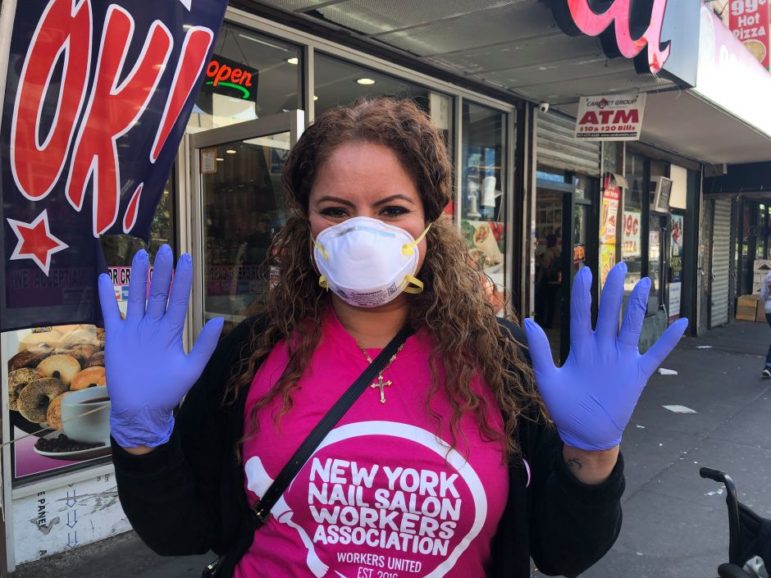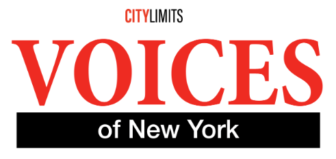
El Diario/Ana B. Nieto
Nancy Baldasua and other nail salon employees distributed protective gear and educational material about workers’ rights in The Bronx.
Read the original story in Spanish at El Diario
Translated and condensed by Carlos Rodríguez Martorell
By the time she does her third acrylic nail set of the day, Nancy Baldasua’s eyes are burning. “They get red,” she said.
The fumes created by the acrylic, made by blending a liquid and a powder, cause red eyes and irritation for nail salon workers, who inhale them on a daily basis.
As she climbed an untidy flight of stairs to a nail salon on The Bronx’s Third Avenue, the 40-year-old Mexico native said she has suffered colic and pain caused by the chemicals she handles at work. Baldasua admitted that she does not always wear a protective mask, but added that the salon’s owners fail to provide it, forcing her to buy it herself.
“I can’t always afford to buy the one that is prescribed for this type of job,” she said on Monday. However, she wants to wear it, and her fellow workers in other salons do so as well.
That is why, at the top of the stairs, Baldasua joined a dozen other employees wearing the Association of Nail Salon Workers’ pink t-shirt, who were about to go out to distribute masks, protective gloves and brochures with information about their rights and ways to prevent work-related illnesses. The plan for the morning was to visit a number of Bronx nail salons while another group did the same in Queens.

Voices of New York spotlights ethnic and community reporting from around the city. Click here to read more.
Four years after a regulation took effect in New York State requiring nail salon owners to provide safety gear to employees if they request it, these workers have barely seen any improvements. Exposed to harmful chemicals, employees who make acrylic nails are more likely to suffer from asthma than those who do not. This is why the fight against toxic working conditions continues.
In the industry, in which workers come mostly from Latin America and Asia, the regulation granting this right is enforced loosely. At the salons visited by the members of the association, most of the workers wearing protective gear had paper masks on, the same ones Baldasua said she buys. The law requires masks type N95 or N100.
In places like Europe, some of the substances used in this sector, such as dibutyl phtalate and formaldehyde, are subjected to strict codes of practice due to the hazard they pose for fetuses and for potentially causing infertility. The chemicals are also linked to conditions such as skin burns, cancer and genetic disorders.
Glenda Sefla, another worker organizing the Bronx team, explained that some business owners lack proper training and do not have the equipment needed to protect workers. “They are more interested in money than health,” she said.
“The authorities do their job up to a certain point, but this is a very big industry,” said Sefla, adding that the problems within the sector “have remained hidden for a long time, but now we are bringing them to light. We the workers must take to the streets to do so.”
Baldasua explained that she is not too shy to go door to door and salon to salon because “I think what we are doing is fair.”
Sefla said that they have organized “a night of mourning for the low health standards in nail salons” for October 14. The event and their outreach efforts are part of the Health, Justice and Dignity campaign the group has launched to draw attention to the working conditions in their industry.
In addition to exposure to chemicals, many of the workers are paid as independent contractors – per service, not per hour – and have no right to paid sick leave.









One thought on “Nail Salon Employees Still Fighting Toxic Work Conditions, Despite State Regulations”
Dust masks prevent the breathing of dust particles but cannot prevent the inhalation of nail chemical product vapors. Dust masks should never be used in place of proper three-part ventilation as described in the Nail Manufacturers Council GUIDELINES FOR CONTROLLING AND MINIMIZING INHALATION EXPOSURE TO NAIL PRODUCTS.
https://aerovexsystems.com/wp-content/uploads/2017/12/Guidelines-on-Inhalation-Exposure_ENG.pdf
Selecting and Properly Using Nail Professional Dust Masks
https://aerovexsystems.com/blog/selecting-and-properly-using-nail-professional-dust-masks/
How to Improve Indoor Air Quality for Salons
https://www.youtube.com/watch?v=S–oNVNk7BA
Nail Manufacturers Council On Safety Publications
“Guidelines for Controlling and Minimizing Inhalation Exposure to Nail Products”
English, Vietnamese, Spanish, Korean & Italian Translations
https://aerovexsystems.com/industry-resources-guides/